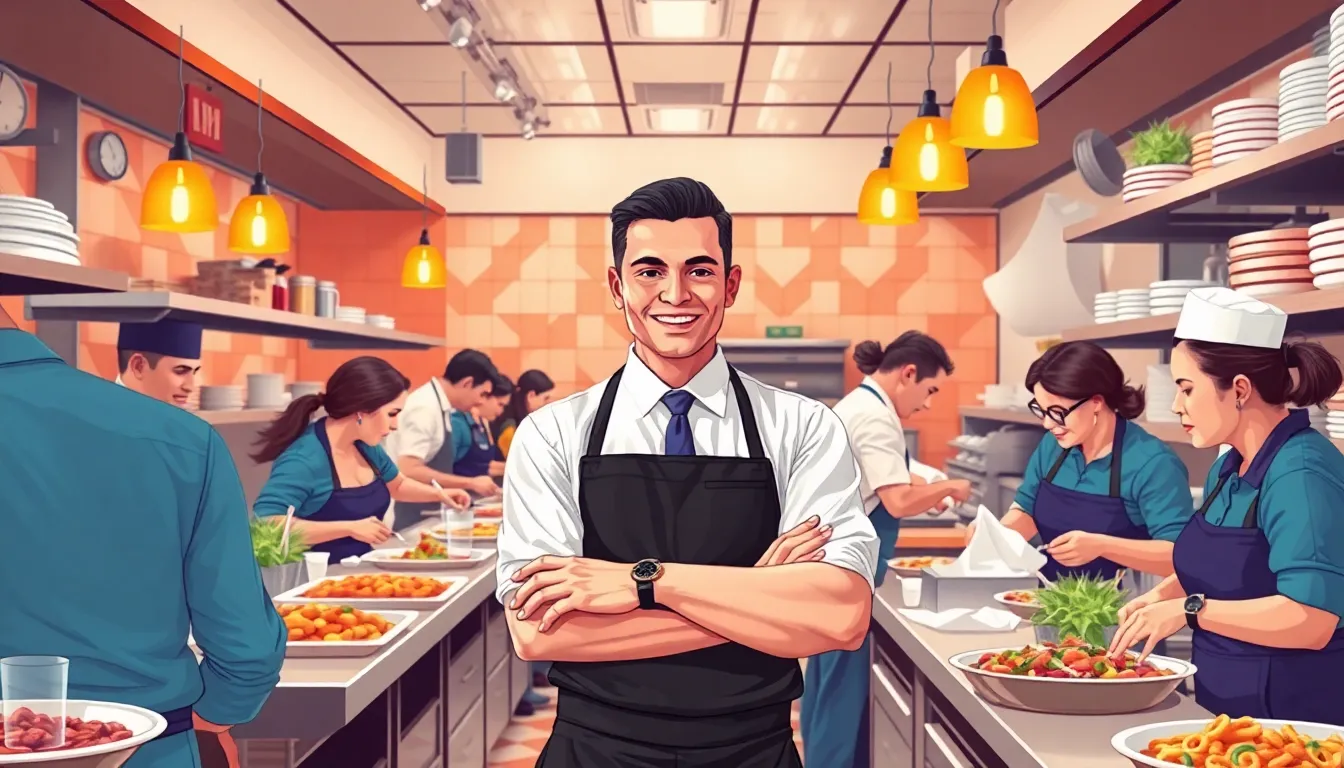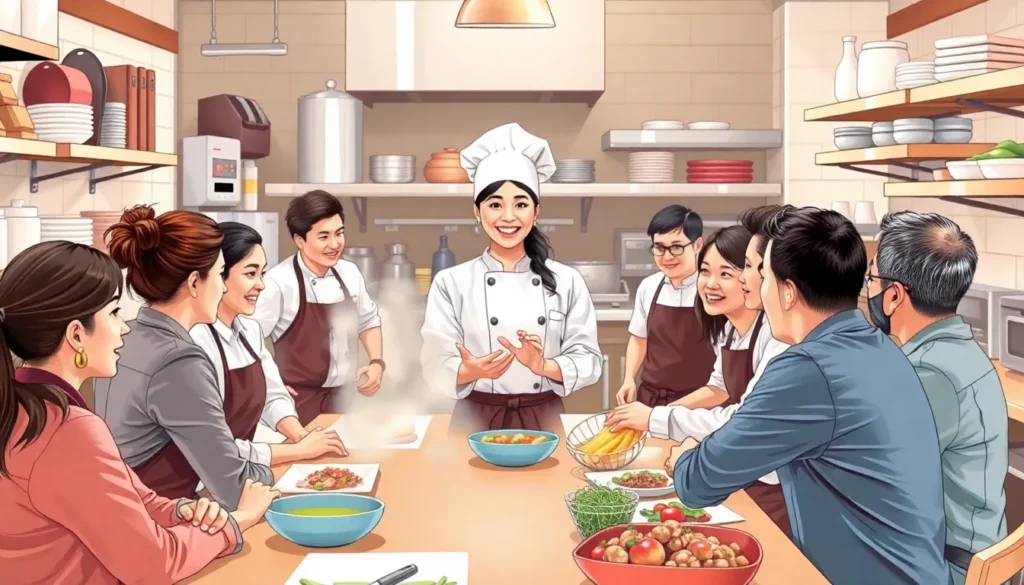In the bustling world of restaurants, leadership isn’t just about wearing a chef’s hat or managing a busy kitchen. It’s about whipping up a recipe for success that blends vision, teamwork, and a dash of humor. After all, what’s a restaurant without a few laughs mixed in with the sautéed vegetables?
From navigating the chaos of dinner rushes to inspiring a diverse team, restaurant leaders face unique challenges that can teach invaluable lessons. Whether it’s learning how to handle a disgruntled customer or motivating staff during the late-night grind, these experiences are the secret ingredients to effective leadership. So, grab a seat at the table and discover the essential leadership lessons that can transform any restaurant into a thriving culinary hotspot.
Table of Contents
ToggleImportance of Restaurant Leadership Lessons
Restaurant leadership lessons play a crucial role in establishing a successful dining environment. They guide leaders in fostering a positive workplace culture that thrives on collaboration. Effective leadership directly impacts staff performance, customer satisfaction, and overall profitability.
Leaders learn to manage diverse teams, understanding that different backgrounds and skills enhance creativity. Developing strong communication skills becomes essential for conveying vision and expectations effectively. Leaders set the tone by demonstrating adaptability, especially during peak service times, which helps teams adjust to challenges.
Mistakes also provide valuable learning opportunities. When leaders share their experiences, they empower team members to learn from setbacks, fostering a culture of resilience. Exceptional leaders inspire motivation by showcasing their passion for the industry, which resonates deeply with staff and clients alike.
Communication builds trust and encourages open dialogue, allowing team members to voice ideas and concerns. Establishing clear goals enables everyone to work towards common objectives, improving overall efficiency.
Moreover, humor adds an element of enjoyment, making the workplace more inviting. Balancing professionalism with a sense of fun encourages employees to engage actively. This balance results in lower turnover rates and a stronger team dynamic.
Ultimately, the lessons learned in restaurant leadership shape not only the business’s future but also the careers of its staff. Leaders who embrace these lessons increase the potential for their restaurant to thrive in a competitive market.
Key Qualities of Effective Restaurant Leaders

Effective restaurant leaders possess a distinct set of qualities that enhance their ability to drive success. These qualities not only elevate team dynamics but also create a thriving environment for both employees and customers.
Communication Skills
Strong communication is vital in the fast-paced restaurant industry. Clear instructions ensure that staff members understand their roles during busy services. Listening actively builds trust, allowing team members to express concerns and share ideas. Encouraging open dialogue fosters collaboration and innovation, making everyone feel valued. Acknowledging feedback promotes continuous improvement, ultimately benefiting the restaurant’s operation and morale.
Emotional Intelligence
Emotional intelligence plays a crucial role in restaurant leadership. Leaders with high emotional intelligence can recognize and understand their emotions and those of others. This awareness helps in responding to employees’ needs and adding a personal touch to interactions. Navigating stressful situations becomes smoother through empathy, which builds a supportive atmosphere. Fostering strong relationships leads to improved teamwork, enhancing overall performance and customer satisfaction.
Building a Strong Restaurant Team
Creating a strong restaurant team requires strategic hiring and ongoing development. Focused efforts in these areas lead to enhanced performance and collaboration.
Hiring the Right People
Selecting the right team members is crucial for restaurant success. Leaders should prioritize candidates with both technical skills and a positive attitude. Assessing cultural fit during interviews fosters a collaborative environment. A strong recruitment process includes role-specific evaluations and real-life scenario assessments. For instance, conducting group interviews offers insights into teamwork abilities. Investing time in hiring reduces turnover, making it a vital part of effective leadership.
Training and Development
Ongoing training equips staff with necessary skills and knowledge. Implementing comprehensive onboarding programs ensures new hires understand expectations and standards. Encouraging continuous development opportunities, such as workshops or online courses, enhances staff confidence. Leaders should also facilitate mentorship relationships, enabling experienced team members to guide newcomers. Tracking progress through regular feedback sessions promotes personal growth and strengthens overall team performance. Investing in training creates a knowledgeable, loyal workforce committed to the restaurant’s success.
Creating a Positive Workplace Culture
A positive workplace culture enhances employee satisfaction and boosts performance. Leaders play a crucial role in establishing this environment through recognition and collaboration.
Recognizing Employee Contributions
Recognizing contributions fosters motivation and loyalty. Celebrating individual accomplishments, even small ones, reinforces a sense of belonging. Managers can implement formal recognition programs or simply express appreciation during team meetings. This acknowledgment encourages staff to strive for excellence. Additionally, sharing success stories helps build camaraderie among team members. Consistent recognition leads to lower turnover rates and stronger team dynamics.
Fostering Team Collaboration
Collaboration is essential for maintaining a harmonious workplace. Leaders can create opportunities for teamwork through group projects and collaborative tasks. Encouraging open communication among employees allows for the exchange of ideas. Trust strengthens as team members share responsibilities and support each other. Regular team-building activities further enhance relationships and foster a sense of unity. When collaboration thrives, overall efficiency improves, and staff feels more engaged in their work.
Adapting to Challenges in the Industry
Adaptation is essential in the restaurant industry. Leaders face dynamic challenges that require quick and effective responses.
Navigating Crises
Crises can arise unexpectedly. Leaders need readiness to tackle issues like supply chain disruptions or sudden staff shortages. Utilizing effective communication strategies builds transparency among staff. Transparency fosters trust, allowing teams to collaborate effectively during emergencies. Crisis management training equips leaders and staff with the skills to respond decisively. Focusing on solutions, rather than problems, ensures that the team remains resilient. Prioritizing adaptability becomes crucial for maintaining business operations under pressure.
Embracing Change and Innovation
Change is a constant in the restaurant sector. Leaders must embrace innovation to stay competitive. Offering new menus or adopting technology enhances customer experience. Exploring feedback channels reveals customer preferences, guiding menu adjustments and service enhancements. Encouraging staff to share ideas fosters a culture of innovation. Leaders recognize that flexibility in operations leads to growth opportunities. Investing in training on new technologies ensures that staff are comfortable with changes. Welcoming change creates a thriving environment, where both the restaurant and its team can flourish.
Restaurant leadership is a dynamic journey that requires a blend of skills and strategies. By fostering a positive workplace culture and embracing adaptability leaders can create environments where teams thrive. Encouraging open communication and recognizing individual contributions not only boosts morale but also enhances overall performance.
As the industry continues to evolve leaders must remain committed to ongoing development and innovation. Embracing change while learning from challenges lays the foundation for a resilient team ready to tackle any situation. Ultimately the lessons learned in restaurant leadership shape not just the success of the establishment but also the growth of every individual involved.





